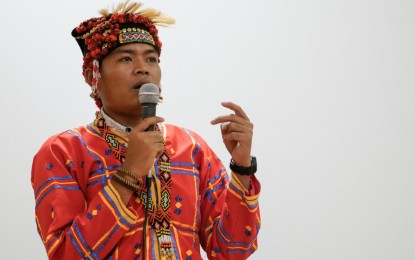
CHILD REBEL. Indigenous People’s (IP) leader Datu Awing Maraan Apuga shares how he became a New People’s Army (NPA) child warrior, during a conference in Chicago, Illinois on Saturday (July 6, 2019). Apuga said he eventually became a teacher of the Salugpungan school tasked to recruit young people to join the armed rebellion, before returning to the folds of the law. (Photo by Mac Villarino/PCOO)
CHICAGO — Datu Awing Apuga was only five years old when his father brought him to an alternative school which projects itself as a safe haven for underprivileged children in conflict-ridden Mindanao.
The Salugpungan school in Talaingod, Davao Del Norte, he said, opened doors for him to rise in life and raise his dreams.
“Masayang-masaya ako, kasi hindi lahat sa amin marunong magsulat at magbasa. Tinuruan nila ako nun (I was very happy because not all of us had the opportunity to learn how to read and write. They taught me these things),” Apuga recalled in an interview.
But little did he know that the institution, which prides itself as a platform borne out of the indigenous peoples’ thirst for self-determination, would sweep him up into a life of violence.
“Habang tinuturuan akong magsulat at magbasa, tinuturuan na nila akong maghawak ng baril, paano mag-target kung may kaaway (While they were teaching me how to read and write, they would teach me how to handle guns, how to target enemies if a fight ensues),” he said.
At 10 years old, Apuga said he was already an expert in assembling firearms — one that would launch him to become a fighter in the countryside.
Apuga would not only ride the tide in his community, but would excel in combat trainings and target shooting, which led him to take on a bigger role in the community.
Would-be warriors
He was only 12 when his comrades, whom he didn’t know were members of a communist terrorist group, sent him to hinterland villlages in his province to train young kids in combat and become instruments of war.
“Ako ang kinuha nila para makapasok ang mga comrades ko doon, sa mga sitio na hindi nila makontrol (They chose me so they could penetrate the sitios which were difficult for them to contol),” he said.
He was chosen, he said, because his father was a respected leader in the Ata Manobo tribe, and he himself was brimming with potential at a tender age.
“Kung ano ang itinuturo sa akin ng mga NPA, yun din ang tinuturo ko sa mga bata. Kasi yun lang ang alam ko (Whatever NPA members tell me, I would pass it on to the children. Because that’s the only thing I know),” he said.
‘Bakwit’
Later on, he would join the exodus of tribespeople who would “bakwit” — a vernacular term for evacuate — which comes against the backdrop of increasing government militarization in IP communities, as what his comrades would tell him.
He said he was among the ones strategizing their “bakwits” and mobilizing the people, given his strong command among the youth.
“Ako ang nag-oorganize sa mga tao, sa mga tactic ng bakwit, dahil ang mga tao dun, isang sabi ko lang, naniniwala agad sa akin (I was the one organizing the people, the tactics of bakwit. I would just say one word, and they would listen to me),” he said.
In 2015, Apuga helped mobilize the youth in Davao Oriental to join several protests including the Manilakbayan, a series of demonstrations held in Manila calling for accountability from the government against alleged human rights violations against the IPs in their community.
Apuga, however, said many of the protesters who joined the rallies didn’t even know what they are fighting for.
“Sinisigaw lang namin, ibagsak ang gobyerno, ibagsak ang burukrata kapitalismo. Hindi nga namin alam ano yun (We would shout, ‘bring down the government, or ‘bring down bureaucrat capitalism,’ but we don’t even know what that is),” he said.
Apuga said he was a witness to hundreds of students joining the NPA, where a lot of them died in the encounters with the Philippine Army.
A few years later, Apuga said he decided to give death to deception, and returned to the folds of law.
“Naisip ko, bakit lagi nalang ako nagsasabi ng hindi totoo? Na-realize ko na tinuturuan pala nila ako magsalita ng mga hindi totoo, ng mga sinungaling na salita para sirain ang gobyerno (Why am I not telling the truth? I realized that they were only teaching me how to tell lies, how to tell stories that would destroy the government),” he said.
In 2018, Apuga said he left their hideout in the hinterland without informing his comrades, as he made a bold move to go back to the government fold.
Apuga, now 25 years old, joined other tribal leaders in voicing out the atrocities of communist terrorist groups in the Philippines.
He is among the eight tribal chieftains who are making their way across the United States to rally the international community to resist the armed insurgency movement’s narratives.
Apuga’s youth may have started with guns and bombs, but this time, he said he is willing to fight with the power of words — arming himself with nothing but the truth. (PNA)
